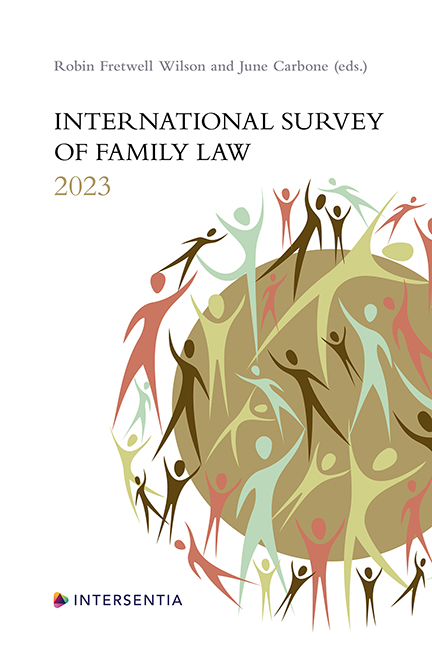Reflections on the International Survey of Family Law
Published online by Cambridge University Press: 03 April 2024
Summary
INTRODUCTION
During the period of my involvement with the Survey, which started in 1981, I saw it go from an informal internal publication to an official, smart-looking and professional vehicle for the dissemination of ideas and developments on a global basis. During the period from 2007 to 2016, I had the privilege of being the General Editor of the International Survey. I inherited a going concern, and was glad to pass it on in much the same state. Although very time-consuming, it was a great enterprise to be involved with. It enabled me to reinforce existing networks, but also to build new friendships and intellectual relationships. Every year there was a definite ‘product’ in the form of a handsome volume. It was a very positive experience for me.
I was no doubt seen as a likely prospect to edit the Survey because I had contributed to the Survey every year since 1981, writing about my home country New Zealand. That contribution began early in my career, and helped cement my own development as an academic. When I was asked to take over the editorship, I felt daunted, but at least I knew roughly what was entailed. I shall comment more specifically on my experiences later on, but first let us explore some of the history of the Survey, with some key moments in its life.
HISTORY
FROM MODEST BEGINNINGS TO A REGULAR PUBLICATION OUTLET
The precise beginnings of the Survey I have found to be murky. The earliest copy I have on my shelves was published in 1979, and is the ‘No. 4’ issue. The first copies were in the form of an annual newsletter, published under the Society’s auspices. Frank Bates, then a reader at the University of Tasmania, and now emeritus professor at the University of Newcastle, New South Wales, had just become editor in time for the 1979 issue, and in his Preface he stated: ‘I have taken the liberty of changing its title to that of the Annual Survey of Family Law, as that name seems better to describe the aims of the publication.’ The wording suggested that it was a unilateral decision, but it stuck, apparently without opposition, and the name continued until 1984.
- Type
- Chapter
- Information
- International Survey of Family Law 2023 , pp. 3 - 14Publisher: IntersentiaPrint publication year: 2023

